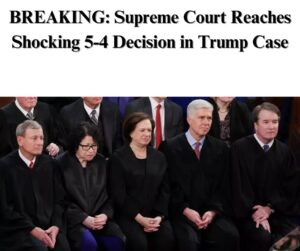
The U.S. Supreme Court rejected the Trump administration’s request to freeze billions of dollars in foreign aid in a controversial 5-4 decision; Congress had previously approved the decision.
This decision enables lower courts to further elucidate the government’s responsibilities in releasing the funds, highlighting the ongoing controversy surrounding executive versus congressional authority.
The case concerns the Trump administration’s decision to halt foreign aid intended for humanitarian, economic, and global health initiatives, which detractors claimed was a political ploy to put pressure on organizations like USAID and the State Department. A group of nonprofit organizations sued, arguing that the freeze was illegal under federal law and Congress’s constitutional spending authority.
U.S. District Judge Amir Ali had set a strict deadline after the administration failed to release the funds as required by a court order. The Trump administration filed an appeal, claiming that processing delays prevented it from meeting the deadline. Although the Supreme Court’s decision does not mandate the funds’ immediate release, it does pave the way for additional judicial review.
Chief Justice Roberts wrote the majority opinion, which was joined by Justices Barrett, Kagan, Sotomayor, and Jackson. It stated that lower courts ought to examine the funds’ release. Alito, Thomas, Gorsuch, and Kavanaugh, the dissenting justices, contended that the lower court had gone too far in directing the release of the funds.
A larger legal battle over executive power includes this case. In order to disrupt important international aid initiatives, the Trump administration used the freeze to pressure government agencies to change their policies, including ending thousands of USAID and State Department awards.
Although the decision gives foreign aid initiatives a brief reprieve, it does not address concerns regarding the boundaries of presidential power. Given the Court’s ideological differences, it is likely that cases pertaining to executive authority and fiscal policy will continue to spark intense discussion and division in the future.
With possible long-term ramifications for U.S. fiscal policy and international humanitarian efforts, the decision represents a turning point in the balance of power between the legislative and executive branches.









